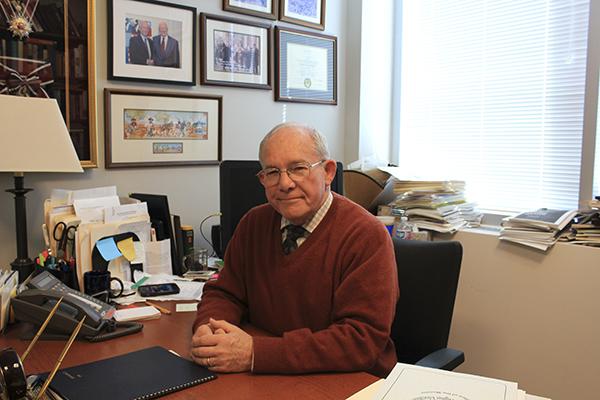The University wants to bring Kuwait to campus.
GW representatives met with Kuwaiti government officials last week to establish “an understanding” to admit more students from Kuwait and exchange faculty between the country and GW. Officials said the collaboration would add admissions resources for Kuwaiti applicants and eventually add a visiting scholar from Kuwait or a graduate fellowship.
This is one of the recent programs between the University and countries like Korea and Turkey over the past two years.
Donna Scarboro, the associate provost for international programs, said a memorandum of understanding between the countries will take effect in the next academic year.
Scarboro said the memorandum of understanding will “promote collaboration” between the countries with faculty visits to Kuwait and increased opportunities for Kuwaiti students to attend GW.
“The goal is to enhance knowledge and understanding of the issues associated with Kuwait and the Persian Gulf region and provide expert views on relations between Kuwait and the United States and other countries,” Scarboro said in an email.
Edward Gnehm, a former U.S. ambassador to Kuwait and Jordan who now directs the Middle East Policy Forum at GW, signed the memorandum of understanding in Kuwait on Thursday.
“It was very clear that we wanted to strengthen the relationship between the University and Kuwait,” Gnehm said in an interview after returning from the country.
Gnehm, who described the understanding as a “framework for cooperation,” said it will facilitate annual programs at GW that focus on the Gulf and Kuwait.
“Many of our students come to GW, yes because it’s in Washington, but also because it has the global perspective, and so I think this will enrich the student body,” he said.
Gnehm, an alumnus, said he worked with Scarboro over the last two years to negotiate the text of the understanding.
GW has had a strong relationship with Kuwait since Gnehm became a professor. The Kuwaiti government gave GW a $4 million donation last year.
The international understanding fits into GW’s global priorities: At this month’s Board of Trustees meeting, Doug Shaw, the senior associate provost for international strategy, said he is focusing on making the most of international resources in D.C. rather than sending more students or faculty abroad.
Gnehm said while the connection with Kuwait is largely focused on the Elliott School of International Affairs, the collaboration will be University-wide.
Gnehm said there are several programs the University wants to develop but officials will decide how much funding will be set aside for those programs before finalizing them. He said some of those ideas include hosting a visiting Kuwaiti scholar at GW, providing Elliott students with the opportunity for graduate study in Kuwait and creating a graduate fellowship for a Kuwaiti student to be in the master’s program at GW.
“We want to increase the number of Kuwaiti students who come to the University,” Gnehm said. He also said that the University will not give priority to admitting Kuwaiti applicants.
Twenty Kuwaiti students are currently enrolled at GW, according to the Office of Institutional Research and Planning.
Gnehm said that the commitment to admitting more Kuwaiti students most likely won’t happen until next year because the admissions process for the Class of 2020 is almost complete.
Gnehm added that GW’s test-optional policy would help admit more Kuwaiti students because they won’t have to take the American-based SATs or ACTs. Undergraduate applications increased 28 percent from last year after the policy began.
“Truth is, as the University focuses on other aspects of qualifications – such as their activities, their grades, their interest – I think this is going to lead to acceptance of more foreign students,” Gnehm said.
One of the commitments that the University has to fulfill is having the chairman present a lecture in Kuwait each year. GW also agreed to use an admissions representative as a point of contact between the government of Kuwait and international students to help them with the application process.
“There is an obligation that we will send a representative from the admissions office to Kuwait each year to be available for prospective students to meet,” Gnehm said.
GW has established several other partnerships in the region. The Graduate School of Education and Human Development helped to create an educational leadership program in Saudi Arabia last year, one of a series of moves to expand the University’s global reach.







